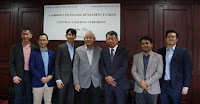In an increasingly polarized world, the need for
multilateral frameworks that enable countries to do business with each other,
even if they do not always see eye to eye, is stronger than ever, said Singaporean Deputy
Prime Minister Lawrence Wong.
“If we can forge stronger partnerships between the major
powers and all countries in the region, we can help foster a more stable and
prosperous Asia,” he stressed in a keynote speech at the 55th Wharton Global
Forum on Saturday, calling for new working arrangements and international collaboration
to tackle issues that affect everyone, such as climate change and future
pandemics.
“We must all work together to fortify multilateralism, and
the global rules of the game.”
What
happens over the next few decades will be defined by how the rivalry between China
and the US unfolds, said Wong, describing Taiwan as a dangerous flashpoint,
with the Ukraine war adding to tensions.
Speaking to 800 alumni of Wharton School of the University
of Pennsylvania, business leaders and government officials at the Shangri-La
Singapore, he noted that on the economic side, the era of untrammeled globalization
we enjoyed over the last 30 years is over.
More
and more multinationals are looking to move production back home or relocate to
markets that have a bigger consumer base, where they are less likely to get
caught in geostrategic crossfires.
“Governments are also embracing more muscular industrial
policies. The US, China and European Union are stumping out more aggressive
support, in the form of tax breaks and subsidies, to develop domestic strengths
in what they assess to be critical industries like semiconductors and green
energy. We are seeing the emergence of an industrial policy arms race, and a
huge contest for leadership in key technologies, which is likely to escalate
with time,” said Wong, who is also Singapore’s Finance Minister.
“Left unchecked, if this trend continues, we will see a more
fragmented and dangerous global order.”
While
the leaders of both the US and China have affirmed their intent to engage one
another and said they do not want a new Cold War, more needs to be done, said
Mr Wong, highlighting Singapore’s support for multilateral pacts such as the
Regional Comprehensive Economic Partnership, the world’s largest free
trade agreement, covering countries such as China, Japan, Australia and the 10
Asean nations.
“Meanwhile, the US has signaled its continued commitment to
deepen its economic engagement of the region through the Indo-Pacific Economic
Framework. Singapore has welcomed this too and hopes to work with partners to
develop a framework which is open, inclusive, and flexible.”
Wong highlighted how an open, rules-based international
order helped keep the world relatively stable.
While such an order was never perfect he said, “This
stability fostered international cooperation and gave birth to an era of
unparalleled economic transformation – many countries prospered, and millions
were lifted out of poverty”.
“Today the world is more divided than ever before. But
amidst these differences, we must find enough common ground to solve our
collective problems.”
He added that multilateral institutions, like the World
Bank, World Trade Organization and World Health Organization, which have helped
define the rules-based international order over the decades, remain strong and
relevant.
Wong
said Singapore would do its part to advance these goals, while being realistic.
“After all, we are really one of the smallest countries in Asia. We know that we
have to adapt to the world as it is, not what we would like it to be.”
If not, he cautioned, Singapore might go the way of another
Singapore – an American village founded in the 1830s in Michigan. Once a
thriving lumber port town hoping to emulate the Asian city it was named after,
it is now a ghost town after the lumber trade went into decline.
Wong, who is an alumnus of the University of Michigan, said
Singapore is determined not to meet the same fate. “Singapore today may be in a
stronger position than when we started out... but we will always be that little
red dot in the world. And in this era of change, really, one can never take
things for granted.”
To thrive and prosper, Singapore will do its best to stay
relevant and add value in the global network as a key node for trade, finance,
talent and ideas.
“We
will continue to build a vast network of friends to promote peace and stability
in our region, and, most of all, to preserve our sovereignty and right to
determine our own future.”














